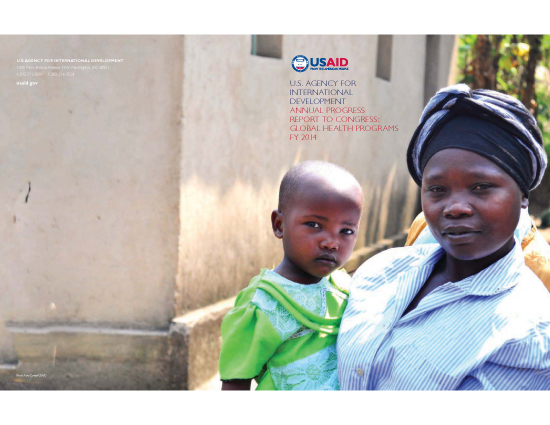Just over 10 years ago, when the President’s Emergency Plan for AIDS Relief (PEPFAR) and the President’s Malaria Initiative (PMI) were introduced in 2004 and 2006 respectively, nearly a million children were dying from malaria and HIV/AIDS was exploding across the globe, killing adults in the prime of their lives and leaving behind orphans and ravaged communities.
After more than 50 years of working in global health, the U.S. Agency for International Development (USAID) is proud of the progress seen across the globe—improving health and saving lives in record numbers. Child deaths decreased by nearly half from 1990 to 2014, saving an estimated 100 million child lives.
Maternal deaths decreased by 45% over the same period. Between 2001 and 2014, malaria mortality rates decreased globally by 47% and by 54% in Africa alone, with estimates that more than four million malaria-related deaths were averted, primarily in children under five in Africa. In USAID’s 24 priority countries, the percentage of married women using a modern method of contraception has increased from approximately 18.4% in 2000 to 31.6% in 2014, enabling healthy timing and spacing of pregnancies which could lower child deaths by 25% and cut maternal deaths by one-third.
Stunting, caused by a lack of essential vitamins and nutrients during the early years and by frequent illness that robs growing bodies of the capacity to utilize available nutrients, has been reduced from 55.6% in 1990 to 37.7% in 2014 in USAID’s 19 nutrition focus countries.
In 2014, the Ebola crisis in West Africa demonstrated to the world that we are all vulnerable to infectious disease outbreaks. The fragile health systems in the three primary Ebolaaffected countries of Liberia, Sierra Leone, and Guinea were simply unable to quickly identify and contain the outbreak. However, through a combined effort of the U.S. Government—along with key contributions from the international donor community, U.S. and local organizations, foundations and the private sector—tremendous progress has been made in containing the epidemic. Overall, USAID’s efforts in helping stop the Ebola epidemic are designed to save lives, mitigate second order impacts, and build structures that accelerate progress toward a world safe and secure from infectious disease threats. This is accomplished through prevention, detection, and rapid response to infectious disease outbreaks, as part of the Global Health Security Agenda, as well as restarting essential health services and strengthening health systems.
USAID’s global health program has three strategic priorities that build on our success and focus our work: Ending Preventable Child and Maternal Deaths, Creating an AIDS-Free Generation, and Protecting Communities from Infectious Disease while building sustainable health systems in the poorest regions of the world. We have bold, ambitious goals and actionable plans to get there. We know what works, based on the scientific evidence, and we measure our progress in our programming to reach our benchmarks and targets. Global health success has been built on good measurement platforms like the Demographic Health Surveys, developed in USAID in 1984, which gauge problems, guide strategy and assess progress. In June 2015, USAID will co-convene the Measurement Summit with the World Health Organization and World Bank, bringing together the global community to construct a common agenda to improve and sustain country measurement and accountability systems for health results in the post-2015 era.
We cannot do it alone. As the economies grow in the countries where we work, USAID is working to explore innovative financing opportunities for leveraging domestic resources and maximizing the results achieved with our investment in health.
This Report to Congress provides a summary of our work towards our goals over fiscal year 2014. On behalf of the American people, we have made real contributions to the health of the world. In partnership with countries, nongovernmental organizations, the faith-based community, and the private sector, we will continue to make strides and save lives.








Comment
Make a general inquiry or suggest an improvement.